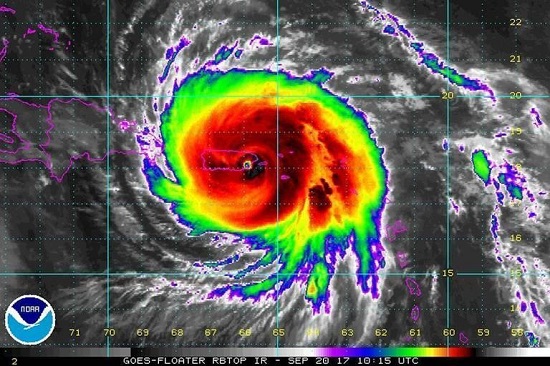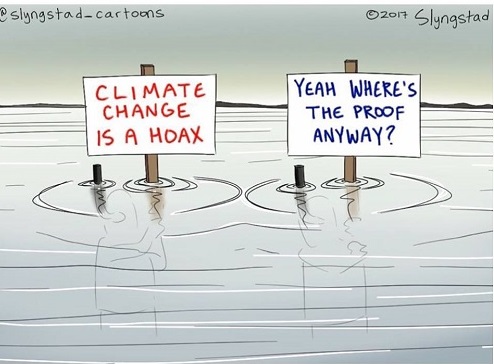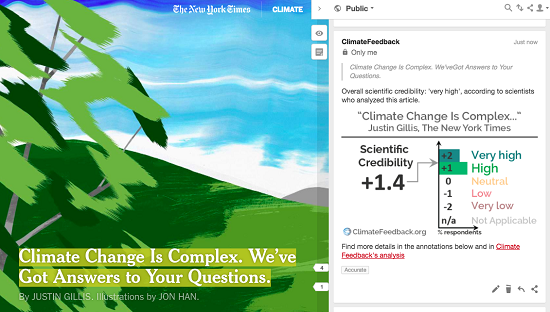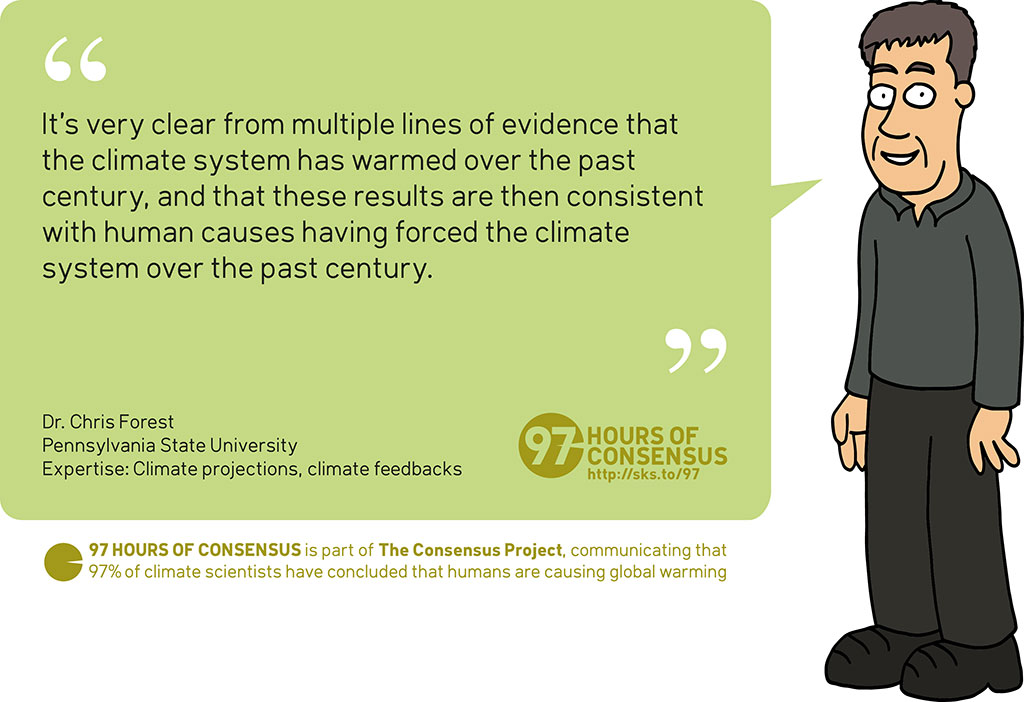2017 SkS Weekly Climate Change & Global Warming Digest #39
Posted on 1 October 2017 by John Hartz
Story of the Week... Toon of the Week... Coming Soon on SkS... Poster of the Week... Climate Feedback Reviews... SkS Week in Review... 97 Hours of Consensus...
Story of the Week...
September is the most energetic month for hurricanes ever recorded in the Atlantic

Satellite image of Hurricane Maria making landfall on Puerto Rico on Sep 20, 2017
The 2017 hurricane season has certainly been one for the record books. Whether it be Harvey’s scale-tipping rains, Irma’s off-the-chart winds, or the sheer number of storms that have spun up, this year is clearly anything but normal.
But how wacky has the weather in the tropics been? For that, meteorologists refer to a figure known as ACE, a measure of every hurricane’s energy put together during its life span. September produced the most ACE in any month on record in the Atlantic Ocean.
ACE, or Accumulated Cyclone Energy, is manifest in stirred-up oceans, steamy downpours, crackling lightning and ferocious winds. The force to instigate these nasty conditions is extracted from the roasting waters of the tropical Atlantic and Caribbean, and transformed into motion through a hurricane’s natural “heat engine.”
To quantify this measure, scientists take into account the strength of the winds within each and every storm, as well as their duration. ACE is calculated every six hours, and a running tally is kept for each storm so long as it sticks around. The measure does not take into account a storm’s size.
September is the most energetic month for hurricanes ever recorded in the Atlantic by Matthew Cappucci, Capital Weather Gang, Washington Post, Sep 27, 2017
Toon of the Week...

Hat tip to Stop Science Denial Facebook page.
Coming Soon on SkS...
- Why the 97% climate consensus is important (Dana, John Cook, Sander van der Linden, Ed Maibach, Tony Lieserowitz)
- Factcheck: Mail on Sunday’s ‘astonishing evidence’ about global temperature rise (Zeke Hausfather)
- Global climate impacts of a potential volcanic eruption of Mount Agung (Flavio Lehner & John Fasullo)
- Guest Post (John Abraham)
- New research, Sep - Oct 1 2017 (Ari)
- 2017 SkS Weekly Climate Change & Global Warming News Roundup #40 (John Hartz)
- 2017 SkS Weekly Climate Change & Global Waming Digest #40 (John Hartz)
Poster of the Week...

Climate Feedback Reviews...

Climate Feedback asked its network of scientists to review the article, Climate Change Is Complex. We’ve Got Answers to Your Questions by Justin Gillis, New York Times, Sep 19, 2017.
Thirteen scientists analyzed the article and estimated its overall scientific credibility to be ‘high’ to ‘very high’.
A majority of reviewers tagged the article as: Accurate
Review Summary
This article in The New York Times serves as a primer by briefly answering seventeen basic questions about the cause and consequences of—and possible solutions to—climate change.
Thirteen scientists reviewed the article, and generally found the answers to be highly accurate distillations of the research on that topic. There are only a few instances where answers—mainly to questions about efforts to reduce greenhouse gas emissions—are worded in an imprecise way that could lead to readers misunderstanding the state of scientific knowledge.
New York Times’ “straightforward answers” to common climate questions are accurate, too, Climate Feedback, Sep 28, 2017
SkS Week in Review...
- 2017 SkS Weekly Climate Change & Global Warming News Roundup #39 by John Hartz
- New research, September 18-24, 2017 by Ari Jokimäki
- Climate and energy are becoming focal points in state political races by John Abraham (Climate Consenus - the 97%, Guardian)
- Right-wing media could not be more wrong about the 1.5°C carbon budget paper by Dana Nuccitelli (Climate Consenus - the 97%, Guardian)
- Potholer on the 1.5C carbon budget paper controversy by Guest Author
- The Mail's censure shows which media outlets are biased on climate change by Dana Nuccitelli (Climate Consenus - the 97%, Guardian)
- 2017 SkS Weekly Climate Change & Global Warming Digest #38 by John Hartz
97 Hours of Consensus...

Quote derived with author's permission from:
"[I]t's very clear from the observations that the climate system has warmed over the past century, and that these results are then consistent with human causes having forced the climate system over the past century."































 Arguments
Arguments






























Just looking at the climate change is a hoax cartoon, this short three minute satirical video is very amusing:
www.youtube.com/watch?v=MnX0-TayVjk
Isn't science comparative? Relative to what? As opposed to what? One year of storms in 13 billion years, or in 241 years of a country's history is not science.
What is the distribution of record breaking hurricanes years between 1776 and 2017 or best data thereof.
[JH] Sloganeering snipped.
Please note that posting comments here at SkS is a privilege, not a right. This privilege can be rescinded if the posting individual treats adherence to the Comments Policy as optional, rather than the mandatory condition of participating in this online forum.
Please take the time to review the policy and ensure future comments ar
Nigelj @1 , thanks yes, the video is amusing. After all, when you boil it down, the denialists have absolutely nothing valid to support themselves with . . . unless you count validly-wacko Conspiracy Theories !
Magellan @2 , please state clearly the point you are trying to make. Is science comparative to voodoo and "Alternative Facts"? Is black comparative to white? I reckon so — but what is the point?
#3 - prior to the satellite error, the ability to accumulate the data to accurately compute ACE was quite limited. As noted by Vecchi, there has been little to no discernable difference in ACE after adjusting for observational limitations since the late 1800's
this citation below is just one example.
The second point is that using a single data point - such as the month of Sept 2017 will most often lead to erroneous conclusions.
journals.ametsoc.org/doi/abs/10.1175/JCLI-D-11-00146.1
the noaa, geophysical fluid dymanics lab frequently mentions that lack of any discernable differences in ACE.
magellan @2.
I assume you are asking about the OP item "September is the most energetic month for hurricanes ever recorded in the Atlantic" and asking 'Most energetic since when?' (By the way, I am not aware of any new sovereign state being formed in 1776. I would guess the date you should be quoting is 1781.)
September 2017 saw Atlantic hurricanes for the month top the Accumulative Cyclone Energy (ACE) record set in September 2004 (ACE=155) with an ACE value for the full month of ACE=176. While historical tropical cyclone data in the Atlantic is more complete than in other ocean basins, it is still subject to inaccuracy prior to the satellite era, pre-1970s. However, with the data available it is possible to say that the ACE=176 for Sept 2017 is certainly the most energetic since before 1950, there being no other month that comes close to that value since then.
As far as the 2017 hurricane season so-far, it has racked up ACE=202 by the end of September and for the time-of-year sits in second place (1950-to-date) behind the 2004-season-to-the-end-of-Sept (ACE=220). It is possible this is =2nd as 1950 is not far behind. 2017 has so-far topped the ACE for all complete years bar five back to 1950, and bar eight back to 1850. This is set out graphically here (usually 2 clicks to 'download your attachment').
Tom13@4
"As noted by Vecchi, there has been little to no discernable difference in ACE after adjusting for observational limitations since the late 1800's"
Its always difficult reconciling your statements with the sources you then quote. You seem to have it wrong. Maybe Im missinterpreting it, but your link says the following and people can make up their own minds.
"The sensitivity of North Atlantic tropical cyclone frequency, duration, and intensity is examined for both uniform and nonuniform SST changes. Under uniform SST warming, these results indicate that there is a modest sensitivity of intensity, and a decrease in tropical storm and hurricane frequencies. On the other hand, increases in tropical Atlantic SST relative to the tropical mean SST suggest an increase in the intensity and frequency of North Atlantic tropical storms and hurricanes."
"The second point is that using a single data point - such as the month of Sept 2017 will most often lead to erroneous conclusions."
I agree.
"the noaa, geophysical fluid dymanics lab frequently mentions that lack of any discernable differences in ACE."
But the following source says the intensity of N Atlantic hurricanes has increased. I guess its just a contested issue, and only more and better data will fully settle whats happened historically.
www.neefusa.org/nature/water/increased-hurricane-intensity